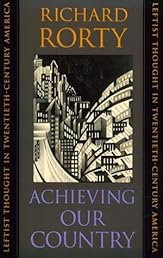
|
Price: $22.33 ( (as of 2016-11-21 20:00:30 PST) You save $1.17 (5%)
(as of 2016-11-21 20:00:30 PST) |
DescriptionMust the sins of America's past poison its hope for the future? Lately the American Left, withdrawing into the ivied halls of academe to rue the nation's shame, has answered yes in both word and deed. In Achieving Our Country, one of America's foremost philosophers challenges this lost generation of the Left to understand the role it might play in the great tradition of democratic intellectual labor that started with writers like Walt Whitman and John Dewey. How have national pride and American patriotism come to seem an endorsement of atrocities--from slavery to the slaughter of Native Americans, from the rape of ancient forests to the Vietnam War? Achieving Our Country traces the sources of this debilitating mentality of shame in the Left, as well as the harm it does to its proponents and to the country. At the center of this history is the conflict between the Old Left and the New that arose during the Vietnam War era. Richard Rorty describes how the paradoxical victory of the antiwar movement, ushering in the Nixon years, encouraged a disillusioned generation of intellectuals to pursue "High Theory" at the expense of considering the place of ideas in our common life. In this turn to theory, Rorty sees a retreat from the secularism and pragmatism championed by Dewey and Whitman, and he decries the tendency of the heirs of the New Left to theorize about the United States from a distance instead of participating in the civic work of shaping our national future. In the absence of a vibrant, active Left, the views of intellectuals on the American Right have come to dominate the public sphere. This galvanizing book, adapted from Rorty's Massey Lectures of 1997, takes the first step toward redressing the imbalance in American cultural life by rallying those on the Left to the civic engagement and inspiration needed for "achieving our country."
Editoral ReviewThere are many shameful incidents in America's past: the institution of slavery, genocidal assaults on the indigenous peoples of this continent, the escalation of the Vietnam War, and so on. What should our response to such acts be? Should we regard the nation as irredeemably tainted by sin and spend our time cataloging its evils, or should we acknowledge its shortcomings and make a conscious effort to turn it into a better nation?Philosopher Richard Rorty believes that there is hope for America, but that today's Left is not meeting the challenge. He contrasts the cultural, academic Left's focus on our heritage of shame (which, he admits, has to the extent that it makes hatred intolerable had the positive effect of making America a more civil society) with the politically engaged reformist Left of the early part of this century. "The distinction between the old strategy and the new is important," he writes. "The choice between them makes the difference between what Todd Gitlin calls common dreams and what Arthur Schlesinger calls disuniting Americans. To take pride in being black or gay is an entirely reasonable response to the sadistic humiliation to which one has been subjected. But insofar as this pride prevents someone from also taking pride in being an American citizen, from thinking of his or her country as capable of reform, or from being able to join with straights or whites in reformist initiatives, it is a political disaster." Not everyone, to be sure, is going to agree with Rorty's ideas. But his approach to civic life, which is pragmatic in the tradition of John Dewey and visionary in the tradition of Walt Whitman, is bound to provoke increased discussion of what it is to be a citizen, and his call for a renewed awareness of the history of American reformist activism can only be applauded.
|
|||||||||||||||||||
Become a fan of Book Presence on Facebook for the inside scoop on latest and most exclusive books.




